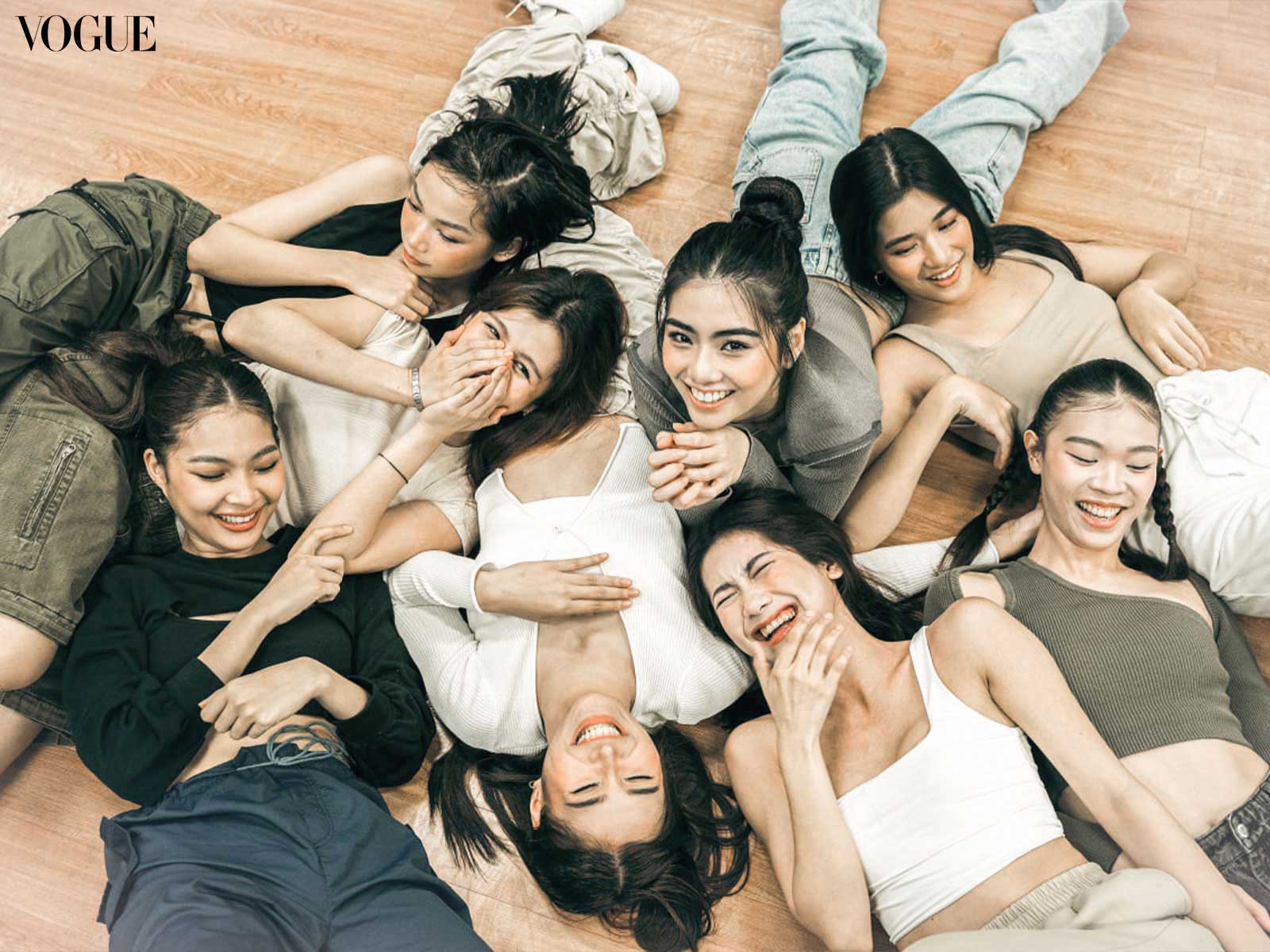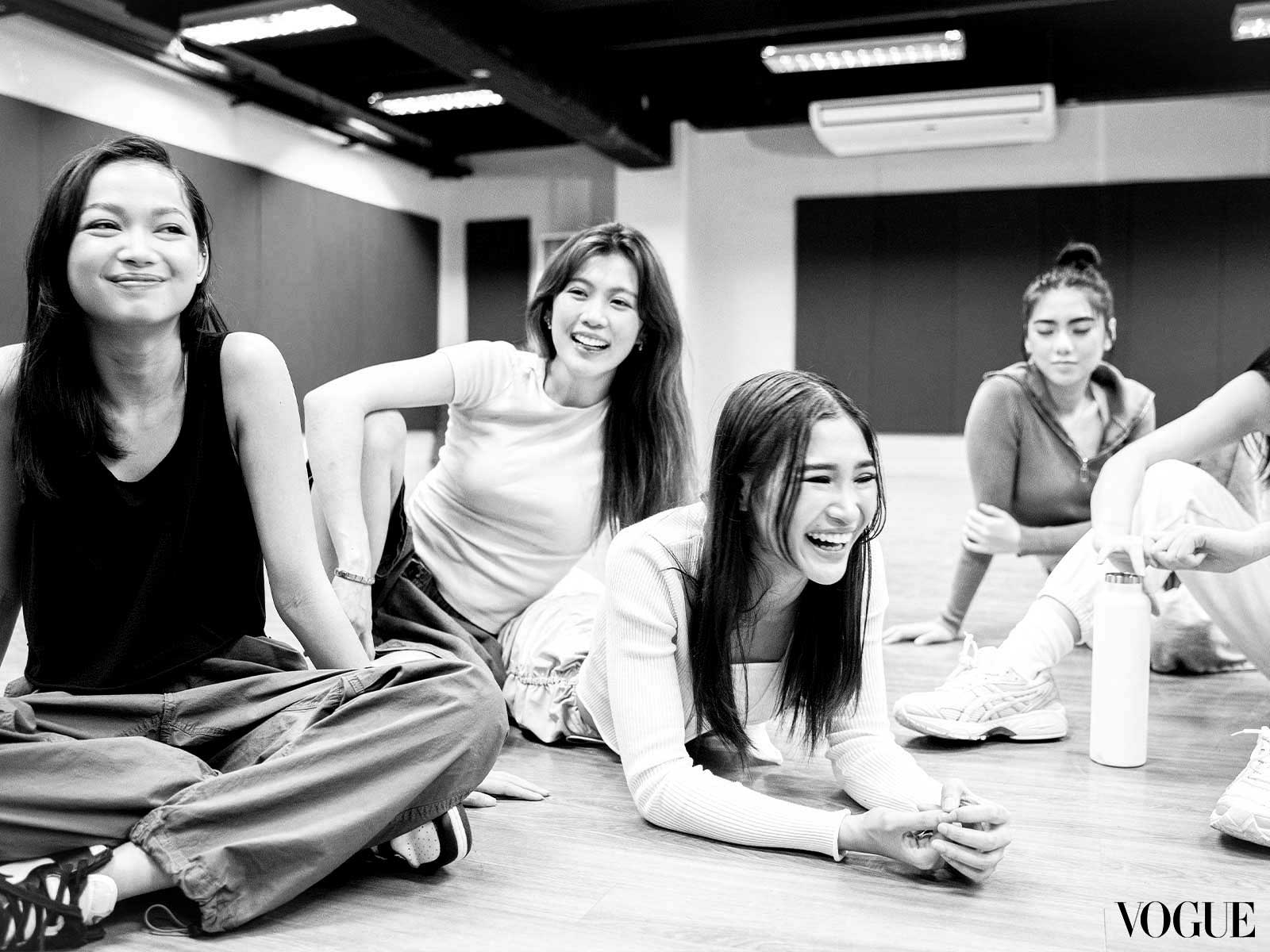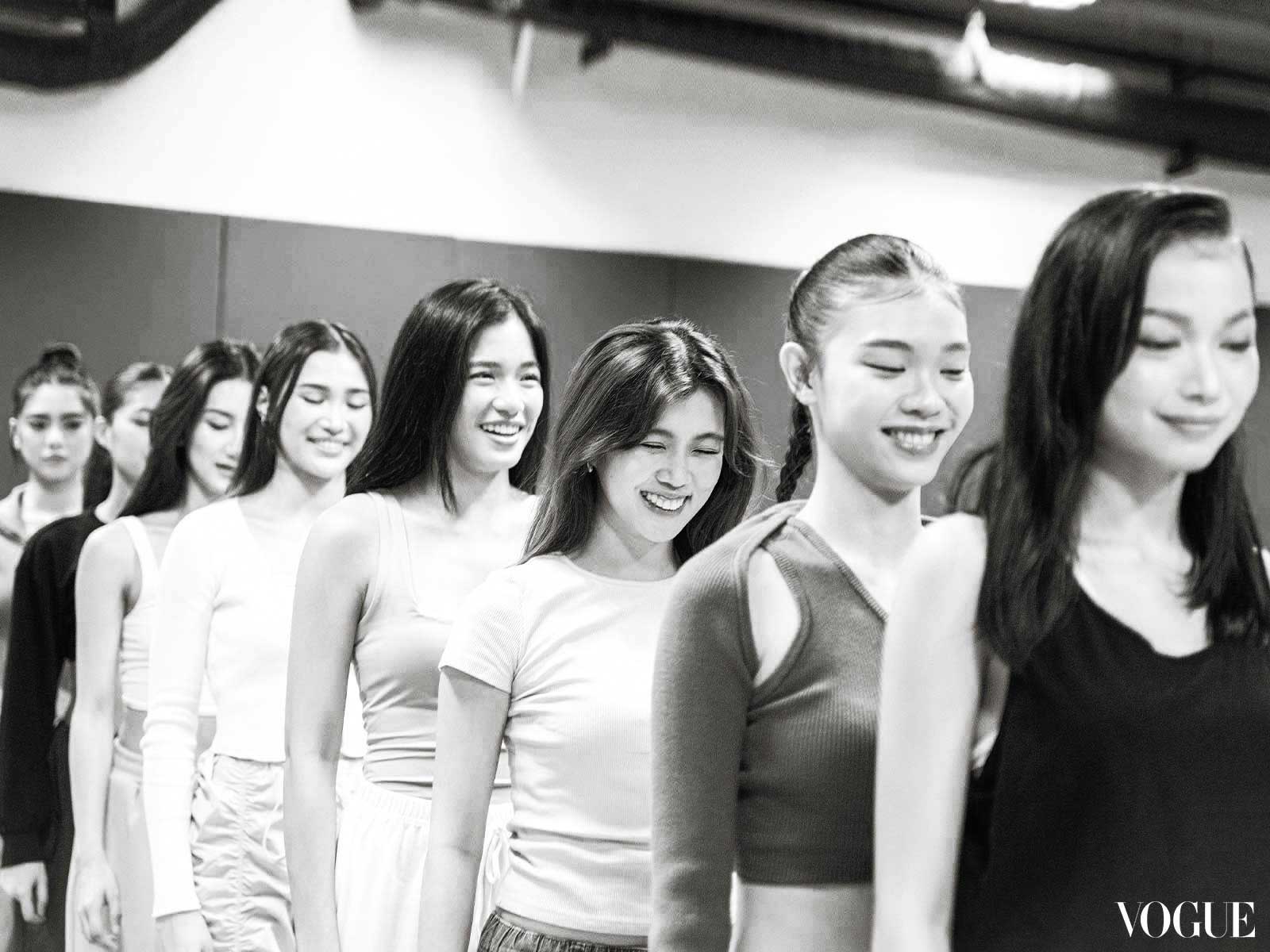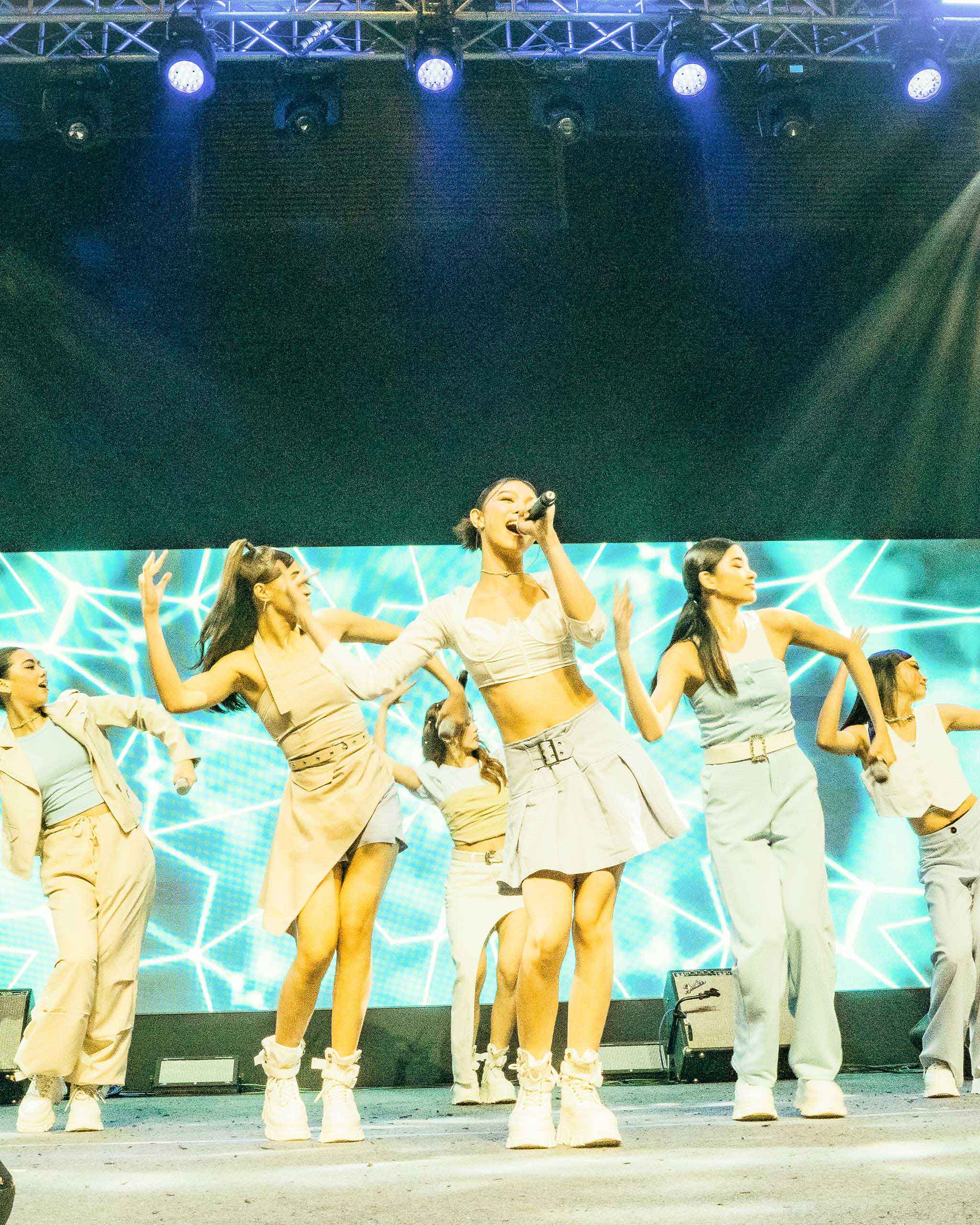Photo by Pat Kay Laudencia. Post-processing by Vogue Philippines
The Nation’s girl group navigates the twists and turns of show business.
The windows of BINI’s van were so darkly tinted that the outside world seemed cloaked in twilight. The crowd gathered outside the backstage entrance of the World Trade Center in Pasay already had their phones up and ready for their exit. Bouncers split the sea of people as the girls step out into the sun, dressed to the nines. They were all smiles, waving at their fans as they’re rushed inside.
In the green room awaited a flurry of activity. They hadn’t even sat down, and they had already been handed cue cards to memorize. They were retouching makeup, brushing up on dance steps, and obliging fans photos all at the same time. Before they knew it, it was time to head to the stage entrance, flanked by more bouncers.
They huddled for a quick prayer by the stage entrance. The host called them into the limelight one by one, in front of fans clinging to the barricades screaming their names: Jhoanna, Sheena, Colet, Maloi, Gwen, Mikha, Stacey, and Aiah.
BINI means business. As part of the trailblazing generation of P-Pop, they’ve ushered in a new wave of entertainment where talent is backed up by dedication and skill. Since their debut in 2021, their meteoric rise to stardom has been propelled not just by talent, but by sheer dedication and skill. Their songs like “Lagi” and “Huwag Muna Tayong Umuwi” were earworms that painted what it was like to come of age, like the rush of falling in love and the honest-to-goodness power of friendship. Rolling Stone even named them one of Spotify RADAR’s rising global artists, and their songs have been translated into Bahasa, Japanese, Spanish, and Thai. While the Hallyu wave continues to drive global entertainment, BINI managed to strike a certain chord with Filipino audiences seeking something closer to home.

In the Philippines, BINI is among the first groups produced through adapting K-pop’s system: a company takes a young talent under its wing, provides a rigid training routine, and sets up a vast machinery of entertainment industry magic into motion. Trainees live and breathe with almost every minute, meal, and motion of their day planned, just to become an idol.
It’s no secret that show business can be ruthless. With countless acts rivaling for the spotlight and the immense investment needed to shape talent, it isn’t enough to be in the right place at the right time anymore. On and off-stage, the eight girls of BINI are constantly in motion to live up to the title of “the nation’s girl group.”
On another day, in their studio in Quezon City, BINI is far more at ease. Today is their first breather after two straight weeks of performances, and they’re working on their second album. Their studio seems like any other standard rehearsal space, with an impeccably polished floor and a wide mirror lining a wall. Under the almost clinical lights, without stage make-up or designer outfits, it’s a place to focus on their craft as performers.
“This is where we shed blood and sweat [Dito ang dugo’t pawis namin],” says Jhoanna, BINI’s leader, with a laugh. Some girls are figuring out the choreography to the new Jihyo song. Others are rifling through social media on their phones, checking up on the BL∞Ms–pronounced “blooms”—which they call their fanbase. Peers pass by and say hello. The complex is shared by other P-Pop trainees and idols under Star Magic, their entertainment company.

Everyone in the group has a specialization: Jhoanna as leader; Sheena, Mikha, and Stacey for dance; Gwen and Aiah for rap; and Colet and Maloi for vocals. Of course, each of them is an all-rounder in her own way. Some of them began training as young as the age of 14 or 15, spending years before debuting to the public. Lately, they’ve been working on the follow-up album to their debut “Born to Win.”
“We have a lot of preparations for that because we want the BL∞Ms to feel that every comeback, it gets better and better,” says Mikha. While the details are under wraps, they’re clearly excited. BINI draws in crowds of devoted fans at their shows, with some flying in from other regions of the Philippines and abroad.
It’s not hard to see why. Stanning is part of P-Pop. Groups aren’t just about the music, they’re experiential: fanmeets, lightsticks, reality show appearances, photocards, merch, biases, and all included. It’s a deep rabbit hole for the uninitiated, but the right group can make one take that dive. BINI’s messages of empowerment and self-love have made them a favorite amongst Filipinos.
Despite this, surprisingly, they still face stage fright. Colet says, “Maganda yung kinakabahan ka, kasi iyon ang parang nagfufuel sa ‘yo to be better. Para mapressure ka. Lagi mong galingan, magbigay talaga ng best mong performance. [The stage fright never goes away. It’s actually better if it’s there, because it fuels you to be better. You’ll be pressured to give your best performance.]”

After the girls warm up, they do a run-through of the effervescent “Lagi-Lagi”. They’re incredibly focused on their reflections in the mirror, scrutinizing every movement. Even without an audience, they’re perfectionists.
Coming up with their performance is a collaborative process with their producers, songwriters, and each other. They have a say when it comes to composing songs, whether it’s brainstorming on new harmonies or writing rap pieces. Maloi considers how to put the “P” in “P-Pop”: “As much as possible, we try to infuse Filipino culture sa lahat ng ginagawa namin. Sa sayaw, may part sa ‘Pit a Pat’ na parang cultural dance. [As much as possible, we try to infuse Filipino culture in what we do. There’s a part in ‘Pit a Pat’ that’s inspired by a cultural dance.]”
Their music is most fulfilling when it’s personal, and they can’t help but be attached to it. With this groundwork laid out, the next process is to realize it, and pull it off well. The choreography in K-pop and P-pop is often complex, textured, and highly detailed, even if it looks effortless to perform. BINI isn’t necessarily the first to do what they do. But this new generation of P-Pop groups is refreshing, because of the kind of sensibility that they offer compared to what dominated the Philippines for decades. Vocal acrobatics and spotlight-stealing—a la Bituing Walang Ningning—have been a part and parcel of Pinoy show business, but BINI know that their group’s strength lies in being a solid unit. Stacey explains “Para po gumaling, kailangan kahit nasa group ka, kailangan pa rin mag-isip pa din ng way para mag-shine ka.” [Everything is still a healthy competition. To get better, even if you’re in a group, you still need to think of a way to shine.]”
Performing happens to be more than a matter of passion. They speak of it as work, including the professionalism that entails. Jhoanna says it’s about respecting your co-workers. BINI has all sorts of traditions when it comes to professionalism. Whoever’s a minute late has to treat the entire group. They make it a point to greet everyone around them, from studio executives to janitors. Their bouncers are also their best friends.

Maloi says someone told her before that talent will take you there, but your attitude will make you stay. The rigid training workouts and tight schedules can be constantly humbling, as they stay on their toes to deliver.
Not to mention that all of them are still in school. Even classes are penciled in their already tight schedules. They’re essentially working students, striking a delicate balance in their commitments of idolhood, academics, and themselves.
The girls come from different provinces in the Philippines, and some of them moved out of their hometowns. Being formed during the pandemic was especially challenging, since most of their connections with their fans took place online. There was a time where they could only see their families from the balcony of BINI’s residence during the strict lockdowns of 2020. It was bittersweet, knowing that they were helping their homes by being away. Most of them are breadwinners of their families, according to Gwen. Being primed for the spotlight from a young age can force a person to grow up. She continues that her dreams keep her going, and that she enjoys being onstage. It’s her breather. After the struggles, stress, and frustration, it’s just her on the stage.

None of them are taking this moment for granted: the chance to make their communities proud, revel in the fervent support of their BL∞Ms, and the opportunity to live a life that other people their age could only dream of.
“Since I’m here, make the most of it. In reality, it’s not going to be forever,” says Aiah. “Especially in this industry, times are changing. So while you’re at it, like what they say, strike while the iron is hot.” It’s a disarming remark, but it really is true. Maybe that self-awareness also comes from growing up in a perpetually online generation where anyone truly could have fifteen minutes of fame. The challenge is how to make that limelight last. Becoming an idol dispels the glitz and glamor it holds in the eyes of others. Expectations are immense, and many of their peers their age have folded under the pressure. Somehow, BINI manages to keep going, with all sacrifices considered.
Despite witnessing what goes on behind the scenes and off-stage, it’s a stretch to fully fathom this way of living within the entertainment industry. It’s not for everyone. But for all they’ve been through, they’ve come out of it a little wiser, and a little tougher. And that makes it more likely for them to see this golden arrow through.
